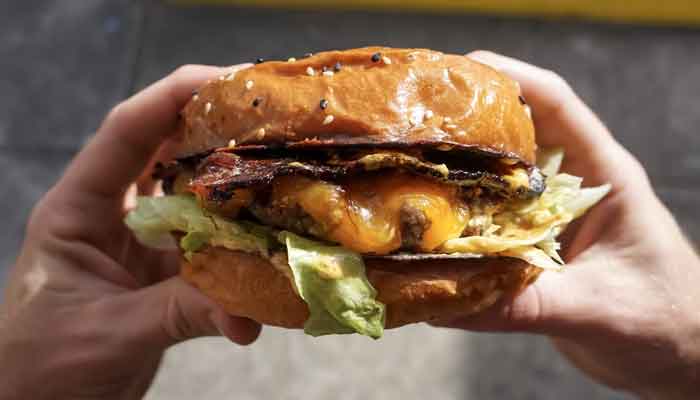Revealed: How many drinks per day could trigger deadly liver disease if you're overweight. Doctors' new warning..
. and it's FAR fewer than you think By LUKE CHAFER Published: 06:55 EDT, 27 April 2025 | Updated: 06:55 EDT, 27 April 2025 e-mail View comments Experts have issued a warning to ‘social’ drinkers as research reveals just how little alcohol it takes to trigger liver disease. Drinking just two small glasses of wine a day, combined with being overweight, doubles the risk of developing the condition, the study found.

The findings come amid a sharp rise in liver disease rates over the past two decades. Doctors have also reported that a growing number of patients not classified as heavy drinkers are being diagnosed. Heavy drinking is defined as consuming five or more drinks on a single day for men and four or more drinks for women.
‘The rise is alarming,’ says Professor Philip Newsome, a liver expert at King’s College London . ‘While some people’s disease is caused by a single factor it is often a combination of two, from being overweight, having diabetes and alcohol consumption.’ The study, published this year, found the combination of heavy drinking and having one of three conditions increased the chances of developing liver disease.
Heavy drinkers with diabetes, high blood pressure or abdominal obesity – a waist size just two inches above average – were twice as likely to develop the condition, researchers from the University of Southern California, who analysed data from more than 40,000 people, found. They believe alcohol and these conditions promote fat build-up in the liver, compounding damage to the organ. Heavy drinking is defined as consuming five or more drinks on a single day for men and four or more drinks for women There is growing concern about the spiralling number of cases.
Diagnoses have surged by 40 per cent and deaths caused by liver disease have risen four-fold in the past two decades. Around 10,000 people a year die from it, with those aged 45 to 64 making up half. The British Liver Trust says 90 per cent of these can be prevented by lifestyle changes.
There are two types of liver disease: alcoholic fatty liver disease and metabolic dysfunction-associated steatotic liver disease (formerly non-alcoholic fatty liver disease). Excess fat build-up in the liver can cause the organ to become inflamed. Over time, this may lead to scarring that limits liver function.
Left untreated, it can result in end-stage liver disease, also known as cirrhosis. Liver disease often presents with few or no symptoms in its early stages, but as it progresses can cause fatigue, jaundice, abdominal pain and swelling in the legs and ankles. The liver filters toxins, produces clotting factors and regulates blood flow.
When it fails, complications follow, which can result in death. For both types, quitting alcohol, losing weight and improving diet can slow or reverse damage. Medications may help manage underlying conditions such as high blood pressure.
But in severe cases, a liver transplant may be the only option. Experts warn that many people are unaware their lifestyle puts them at risk. ‘There is a caricature that people with alcohol-related liver disease are excessively drinking to an extent where they can’t function socially,’ says Professor Newsome.
‘In reality, it is often the middle-class, middle-aged people who drink a bottle of wine with dinner alongside being overweight who are most at risk and don’t realise.’ He says the only way to minimise the risk is to stick to NHS guidelines, which recommend drinking no more than 14 units of alcohol a week. Read More The truth about what happens if you drink more than 14 units of alcohol a week - and how much it shortens your life by (it's shorter than you think) That’s roughly the equivalent of six medium (175ml) glasses of wine, six pints of average-strength beer, or 14 single (25ml) measures of spirits spread over the week, with several drink-free days.
In England alone, 1.9 million people have reported drinking at harmful levels above this that could put them at risk of liver disease. ‘We often see patients who are surprised they have been diagnosed because they consider the amount they drink to be not that much,’ says Professor Debbie Shawcross, a clinical advisor to the British Liver Trust.
Experts warn spiralling obesity rates exacerbate the problem. In the UK, approximately 64 per cent of adults are overweight or obese, and 29 per cent are obese. ‘We now recognise a startling third of the UK population have a fatty liver that results from being overweight or obese, eating an unhealthy diet, not exercising or having lots of ultra-processed foods,’ says Professor Shawcross, a specialist at King’s College Hospital NHS Foundation Trust.
‘Having a pre-existing fatty liver makes an individual more vulnerable to the effects of alcohol and developing liver disease. So if you already have a fatty liver, you may not need to drink much alcohol to be at risk of developing advanced liver disease.’ She also warns binge drinking – six units in one sitting for a woman and eight for a man – can increase your risk even if you only have two binges per week.
Her advice is not to drink alcohol on an empty stomach, to increase exercise levels and to avoid processed foods with high levels of fats and refined sugars. Share or comment on this article: Revealed: How many drinks per day could trigger deadly liver disease if you're overweight. Doctors' new warning.
.. and it's FAR fewer than you think e-mail Add comment Comments 0 Share what you think No comments have so far been submitted.
Why not be the first to send us your thoughts, or debate this issue live on our message boards. Add your comment Enter your comment By posting your comment you agree to our house rules . Submit Comment Clear Close Do you want to automatically post your MailOnline comments to your Facebook Timeline? Your comment will be posted to MailOnline as usual.
No Yes Close Do you want to automatically post your MailOnline comments to your Facebook Timeline? Your comment will be posted to MailOnline as usual We will automatically post your comment and a link to the news story to your Facebook timeline at the same time it is posted on MailOnline. To do this we will link your MailOnline account with your Facebook account. We’ll ask you to confirm this for your first post to Facebook.
You can choose on each post whether you would like it to be posted to Facebook. Your details from Facebook will be used to provide you with tailored content, marketing and ads in line with our Privacy Policy ..
Health

Revealed: How many drinks per day could trigger deadly liver disease if you're overweight. Doctors' new warning... and it's FAR fewer than you think

Experts have issued a warning to 'social' drinkers as research reveals just how little alcohol it takes to trigger liver disease.















